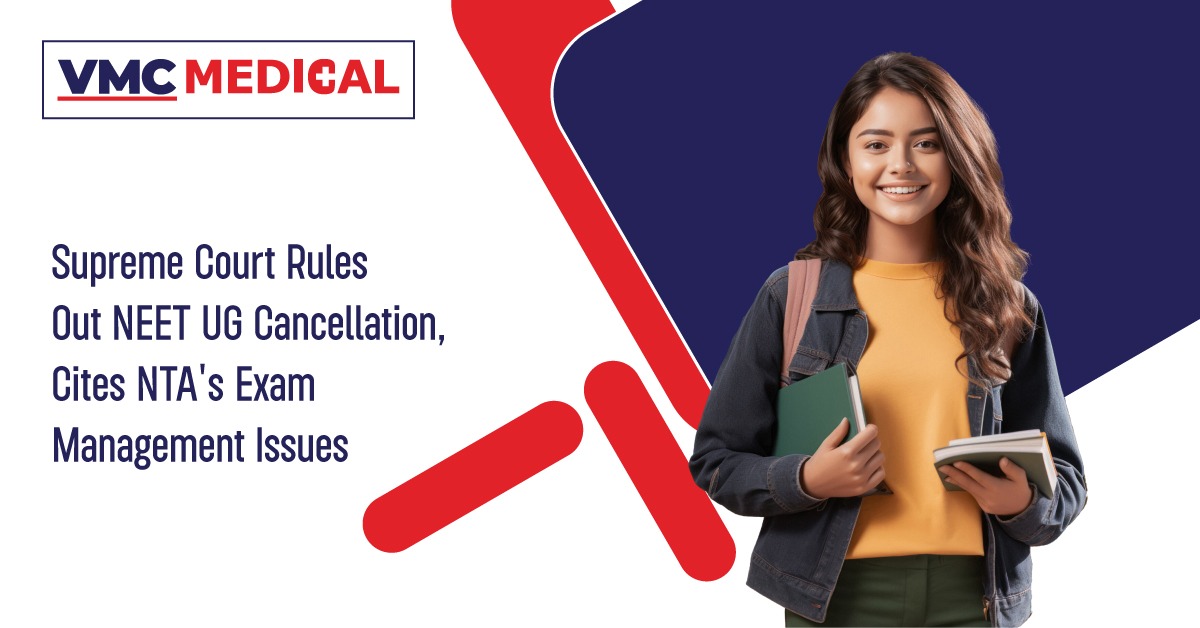Supreme Court Rules Out NEET UG Cancellation, Cites NTA’s Exam Management Issues
 Posted On
Posted On
130 total views, 1 views today
The Supreme Court of India recently ruled against the cancellation of the NEET-UG 2024 exam, despite acknowledging concerns about how the National Testing Agency (NTA) managed the examination. The court highlighted several issues in the administration of the test, raising serious questions about the reliability of the processes in place.
No Systemic Leak, But Serious Concerns
The Supreme Court made it clear in its decision that the NEET-UG 2024 exam would not need to be canceled due to a widespread leak of the question papers. But the Chief Justice of India, D Y Chandrachud, and his three-judge panel voiced serious concerns about the way the NTA administered the test. Participating in the decision-making process were Justices J B Pardiwala and Manoj Misra, who stated that the court’s examination was triggered by recurrent problems with the exam’s administration.
The court emphasized that the NTA’s claim of having numerous exam centers and a large number of candidates does not excuse lapses in conducting the examination. The bench stated that the NTA has adequate resources, funding, and time to ensure that exams like NEET are conducted without such significant errors.
Accountability and Fairness
The Supreme Court criticized the NTA for its inconsistent decision-making, asserting that an organization responsible for significant competitive exams must not make mistakes or amend its decisions post-factum. The court stressed that decisions should be well-thought-out, considering the weight of the responsibility involved. The bench labeled these inconsistencies or “flip-flops” as contrary to the principles of fairness.
Furthermore, the court addressed the issue of intense competition among aspirants and the commercialization of education. It highlighted that certain towns and cities, known for their coaching centers, have higher success rates but are also prone to malpractice. The bench urged that all instances of cheating and unfair practices must be addressed with severity, regardless of the location.
Formation of an Expert Committee
Chief Justice Chandrachud, writing on behalf of the bench, underlined the necessity of forming a committee to investigate and address the structural issues in the examination process. The Supreme Court noted that the Centre had already established a seven-member expert committee, chaired by K Radhakrishnan, former chairman of ISRO. This committee is tasked with examining various aspects of examination security and administration.
The committee will delve into the following areas:
- Examination security and administration issues.
- Analysis and suggestions on cutting-edge data security procedures, such as encryption and safe data transfer, to stop leaks and illegal access.
- Review and recommend updates to NTA’s policies and Standard Operating Procedures to ensure they align with best practices and effectively address evolving challenges in exam security.
Moreover, the committee will explore the possibility of international cooperation, encouraging collaboration with examination bodies and educational authorities from other countries to share best practices, security measures, and innovative solutions.
Extended Deadline for the Committee Report
Recognizing the expanded scope of the committee’s work, the Supreme Court extended the deadline for submitting its report to the Union Ministry of Education from August 22 to September 30. The court mandated that the Ministry of Education must decide on the committee’s recommendations within a month of receiving the report. The ministry is required to prepare and begin implementing an action plan based on these recommendations and report compliance to the court within two weeks of deciding on the implementation.
The Interim Verdict and Its Implications
In July, the Supreme Court issued an interim verdict on several petitions seeking a re-test of NEET-UG 2024. While the court acknowledged a breach had occurred, it emphasized that ordering a retest depended on whether the breach was systemic and compromised the integrity of the entire exam process. The court also considered whether it was possible to differentiate between those who benefited from the fraud and the students who remained unaffected.
Moving Forward: Strengthening Examination Processes
The Supreme Court’s judgment to keep the NEET-UG 2024 exam open demonstrates their sophisticated grasp of the difficulties associated with major competitive examinations. The court concentrated on structural improvements to improve the integrity and security of the examination process, while acknowledging the breaches and mismanagement difficulties.
The formation of an expert committee and the mandate for comprehensive reforms signify a commitment to improving the administration of crucial exams like NEET-UG. The involvement of experts from diverse fields ensures that the recommendations will be well-rounded and address the multifaceted challenges in exam management.
As India continues to grapple with the challenges of conducting large-scale competitive exams, the focus must remain on transparency, accountability, and fairness. By implementing the recommended reforms, the NTA and the Ministry of Education can work towards rebuilding trust and ensuring that future exams are conducted smoothly, providing a fair opportunity for all aspirants.
Closing Thoughts
The Supreme Court’s ruling serves as a pivotal moment for the NTA and the broader examination system in India. By addressing the systemic issues and prioritizing reforms, the education system can move towards a more reliable and secure examination process. This approach not only safeguards the interests of students but also strengthens the credibility of competitive exams in the country.




